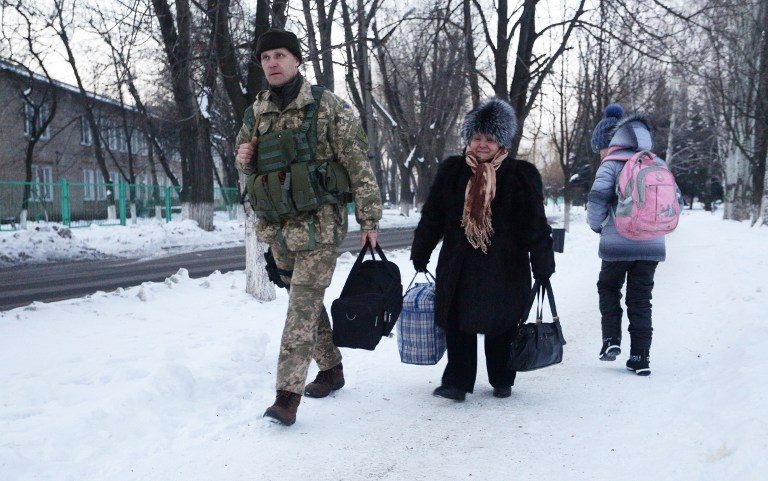SUMMARY
This is AI generated summarization, which may have errors. For context, always refer to the full article.

AVDIIVKA, Ukraine – The UN Security Council Tuesday, January 31, called for an immediate return to a ceasefire in Ukraine where 3 days of fighting in a flashpoint town have left at least 13 dead and thousands of locals without power in freezing conditions.
Endorsing a Kiev-drafted statement that did not raise objections from Russia, members “expressed grave concern about the dangerous deterioration of the situation in eastern Ukraine and its severe impact on the local civilian population.”
The Council’s unanimous call came as Ukrainian forces and Russian-backed rebels were locked in fighting for a third straight day in the flashpoint town of Avdiivka that has also sparked renewed EU concern about security in its backyard.
The industrial hub came under an unexpected assault Sunday, January 29, from insurgents seeking to wrest back territory controlled by Kiev during the nearly 3-year war.
The clashes have claimed the lives of at least 13 civilians and fighters on both sides since Sunday – the worst outburst of violence since the two sides agreed a new truce on December 23.
Ukrainian President Petro Poroshenko underscored the urgency of the situation by cutting short a visit to Berlin on Monday, January 30, and convened an emergency meeting of his National Security and Defence Council.
Poroshenko is worried that Donald Trump’s rise to the US presidency and praise for Russia’s Vladimir Putin may add fuel to a conflict that began shortly after Ukraine’s 2014 ouster of its Moscow-backed leader and tilt toward the West.
Putin’s spokesman Dmitry Peskov told reporters the Kremlin was “extremely worried” but had “reliable information” that renegade units of pro-Kiev fighters were in fact responsible for the initial attacks.
An Agence France-Presse reporter saw the separatists shell the town of about 20,000 people with repeated rounds of Grad multiple rocket systems and artillery fire from the early morning.
“Right now, there is no power. We have not resolved problems with heating homes, and the gas pipe has been shattered,” local Ukrainian army unit spokeswoman Olena Mokrynchuk told Agence France-Presse.
The town’s military administrator Freedon Vekua told Agence France-Presse he was preparing for a possible evacuation of the town that sits just north of the rebels’ de facto capital of Donetsk because of the power outage.
Ukraine is struggling through freezing conditions in which temperatures drop to -20 degrees Celsius (-4 degrees Fahrenheit) at night.
“The issue of an evacuation has not been decided fully. We see it as our very last resort because there is still a chance of restoring heating,” said Vekua.
The town’s heating is provided by a coke plant that has been heavily damaged by the falling shells.
Plant director Musa Magomedov said it would be incredibly difficult to resume gas production were the factory’s generators shut down.
That would leave Avdiivka without a source of local power and uncertainty about its future. The fighting has prevented repairs being carried out, Magomedov said.
Global condemnation and concern
The Organization for Security and Cooperation and Europe (OSCE) is responsible for monitoring ceasefire violations and organizing peace talks between envoys from Russia and Ukraine.
It helped negotiate a February 2014 truce deal in Minsk that was co-sponsored by Germany and France and which EU leaders cling on to as the one remaining roadmap to peace.
“The intense fighting around Avdiivka in the last few days… is a blatant violation of the ceasefire, as stipulated by the Minsk agreements,” the EU foreign affairs arm said in a statement.
The OSCE said the fighting was “of grave concern” while the US embassy tweeted that it was especially worried about “the 2,500 children who are without water, electricity and heat”.
Charge d’affaires Kate Byrnes of the US mission to the OSCE’s Permanent Council said that “Russia and the separatists initiated the violence in Avdiivka”.
Washington was “deeply concerned” and called for an immediate ceasefire “to avert a larger humanitarian crisis”, State Department spokesman Mark Toner said.
The conflict has killed nearly 10,000 people since 2014 – more than half of them civilians – and plunged Moscow’s relations with the West to a post-Cold War low.
The Kremlin denies backing the insurgents and only admits that Russian “volunteers” and off-duty soldiers have entered the warzone of their own free will. – Rappler.com
Add a comment
How does this make you feel?
There are no comments yet. Add your comment to start the conversation.